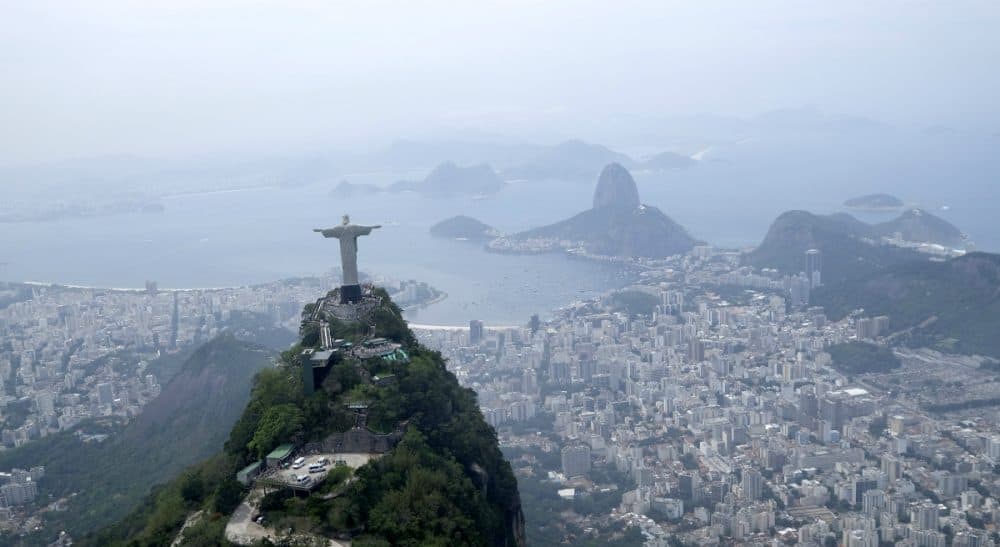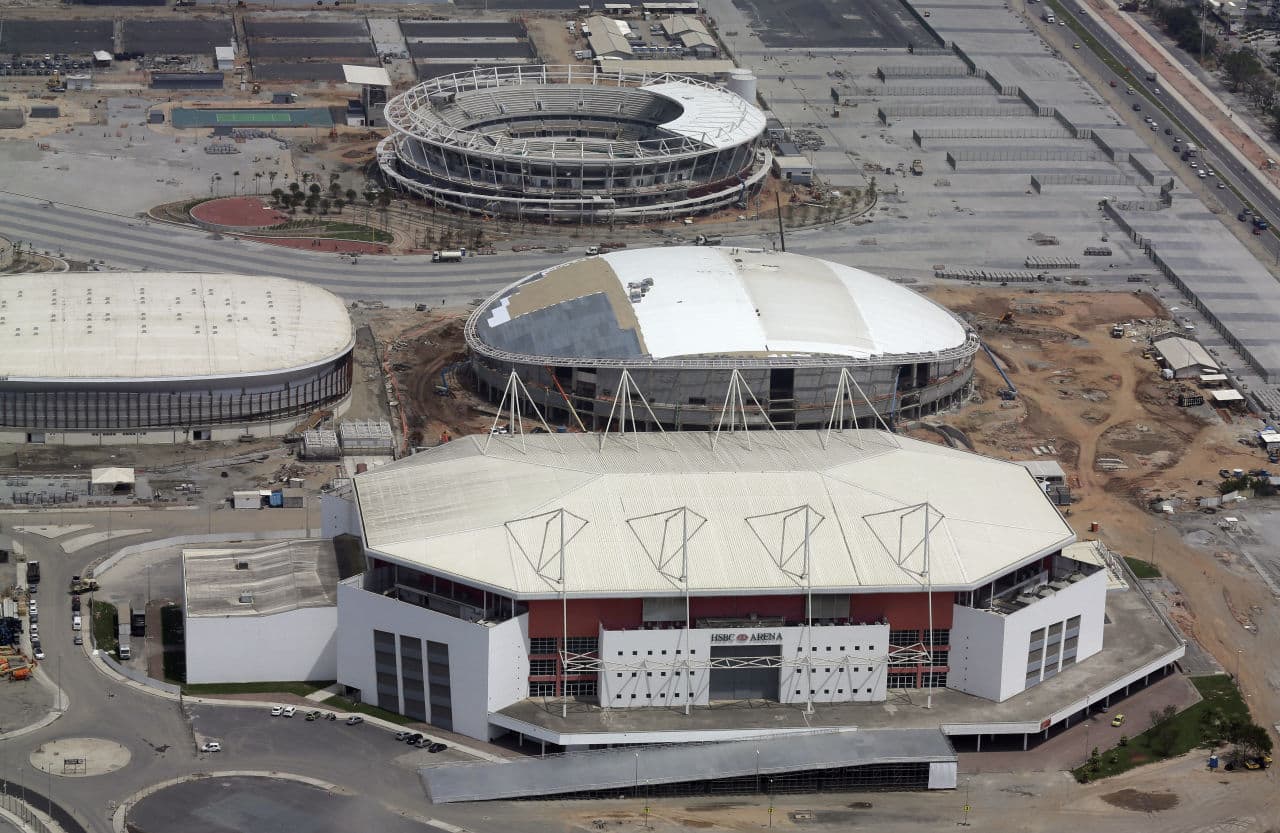Advertisement
The Road To Rio Is Paved With Broken Promises

One of the pleasant fictions the International Olympic Committee (IOC) spins when naming a host city is to promise that when the Olympic carnival leaves town it will leave behind some fantastic legacy: a high speed rail line, a new airport, bike paths, a revitalized district, sporting venues, athlete villages that convert to low-cost housing or college dorms, a park, a subway extension, environmental clean up ... any and all of the above.
These promised improvements are seldom realized, as the recent Winter Games in Sochi, Russia can attest. With a price tag of $55 billion, Sochi was the richest Games in Olympic history. Its legacy was supposed to be the creation of Russia’s first world-class ski resort, on a par with Zermatt or Vail, where Russian vacationers could flock instead of taking their rubles to their favorite Alpine haunts. A new 31-mile, $8.7 billion high speed rail line (which came in at 90 percent over budget) was created to whisk would-be skiers from the Black Sea to Krasnaya Polyana, the four-resort ski cluster built in the Caucasus mountains to host the ski and snowboarding events in 2014. It was Vladimir Putin’s gift to the motherland: a Slavic wilderness transformed into a bustling hot spot of winter activity and fun.
On paper, it appeared magical. In reality, it was a mirage.
Two years later, little of that has happened. With the Russian economy in shambles from Western sanctions and tumbling oil and gas prices, the skiers show up for a couple of weeks around New Years, then largely vanish. In the summer, Sochi and Krashaya Polyana are ghost towns. The vast parking lots surrounding the Olympic venues are concrete deserts. The high speed rail line from the airport isn’t operating, and the one from the city of Adler into the mountains, which ran every 15 minutes during the Olympics, now goes only six times a day in high season. The speedskating venue is barely used; the Olympic Park is described by Russian journalists as a “ghetto,” and the $779 million Fisht Stadium, which was only used in the Opening and Closing Ceremonies, lies idle, its roof partially dismantled in preparation for the 2018 World Cup. The Bolshoi Ice Dome, which cost $300 million to build, is home to one hockey team, and costs some $14,500 a day to maintain. The state has absorbed some $3 billion in bad loans made to a pair of Russian oligarchs who financed some of the facilities, and the annual price tag the government pays to maintain the Olympic venues has been estimated at $1.2 billion a year. That is the legacy the citizens of Sochi, and Russia, have inherited from the 2014 Olympic Games.
Thank you, IOC!
So what will Rio de Janeiro’s legacy be? It’s looking more and more like a trail of broken promises. The original bid, which was accepted in 2009 when Brazil’s economy was booming, promised that the Olympics would be the catalyst for Rio to clean up the stench and pollution in Guanabara Bay. It would lead to upgrading the impoverished favelas adjacent to Olympic venues. “Legacy villages” would be built, as many as 24,000 new rooms for low-income Brazilians. The subway line would be extended; low emission buses would be introduced, and reforestation projects around the Olympic Park would lessen Rio’s carbon footprint. Some of the sports complexes left behind would be converted into swimming pools and schools.

On paper, it appeared magical. In reality, it was a mirage. Brazil’s economy has tanked and spiraled into recession. Its president, Dilma Rousseff, faces impeachment, accused of bribery and corruption. While billions have been siphoned into athletic venues of absolutely no use to the average Brazilian, overcrowded hospitals have been turning away patients. The mosquito-borne Zika virus has been raging unchecked. The head of a construction firm that did much of the Olympic work, Marcelo Odebrecht, has been sentenced to 19 years in prison for distributing some $35 million in bribes in connection with previous government projects. Instead of legacy villages for the poor, more than 1,000 low-income homes have been torn down near the Athlete’s Village, which, after the carnival leaves town, will be converted into luxury apartments selling for as much as $700,000 each. The Olympic subway extension, as yet unfinished, will service, not the poor, but those who live in the luxury apartments. The new Olympic golf course, which will be public for the next 20 years, is situated in the wealthy neighborhood of Barra da Tijuca, far from the madding crowd.
The party will be great. The legacy for [Rio] will be garbage.
Luiz Martins de Melo
There’s more. The cleanup of Guanabara Bay has never happened. Only 10 percent of the fuel used by the new Olympic buses is biodegradable. Ninety percent is common diesel. And the reforestation of the area around the Olympic Park has been abandoned in favor of further development. Eleven workers have died doing Olympic-related construction, and a new bike path, hurriedly built and open just four months, recently collapsed, killing two cyclists. And the Games have yet to begin, the final bills have yet to be paid.
One hopes members of the IOC are paying attention to who is really benefiting from the Rio Olympics and its $13 billion budget: the rich, the well connected, the powerful. Promises aside, it will do little to improve the quality of life for Rio’s common man.
“It’s too much money,” says Marcelo Barreto, a Brazilian television sport journalist. “If a third world country can help deliver this message [to the IOC], I think it would be a positive role in the history of the Olympics.”
“The party will be great,” Luiz Martins de Melo, an expert on the economics of sport at Rio’s Federal University, recently told The Guardian. “The legacy for the city will be garbage.”
